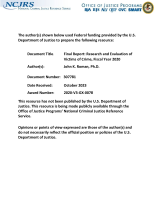Does Encouragement by Others Increase Rape Reporting? Findings From a National Sample of Women
Journal
Psychology of Women Quarterly
Date Published
2014
Agencies
NIJ-Sponsored
Publication Type
Research (Applied/Empirical)



